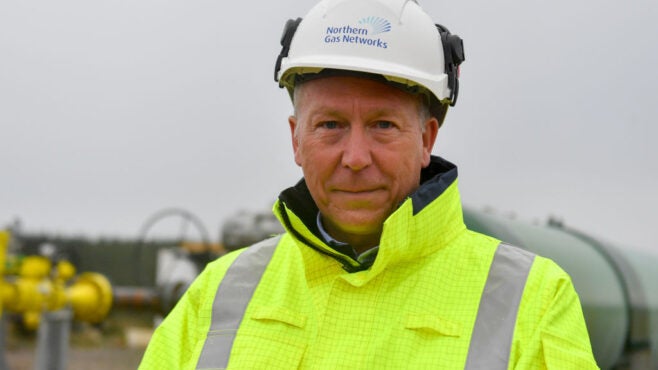The most-read article on Energy Monitor in the first year since its launch was about hydrogen. More specifically, it was a warning that proposals to heat homes with hydrogen offer “a solution worth much less than it first appears”. This piece, by Jan Rosenow of the non-profit Regulatory Assistance Project, sets the tone for a year in which Energy Monitor’s most-read articles reported on some of the most challenging aspects of the energy transition.

Energy Monitor was launched on 15 September 2020 by the New Statesman Media Group. We have since become part of GlobalData. The goal remains to provide data-led analysis of the energy transition. The transformation of the energy system – responsible for three-quarters of greenhouse gas emissions worldwide – lies at the heart of the quest for climate neutrality. In the run-up to COP26 in Glasgow, Scotland, the world is coming face to face with its commitment to net-zero emissions by 2050.
Energy Monitor exists to help businesses, governments and regulators get to grips with the opportunities and risks of this transition. Renewables and energy efficiency lie at the heart of the energy transition. If they seem obvious, they are far from undebated. Two of our top 20 most-read articles over the past year made a case for renewable power. One of them argued that green power does not have to mean higher electricity bills; the other made the point that electrification will not increase carbon emissions, with greater deployment of renewables.
Electrification is a core tenet of the energy transition, and it was pervasive in our most-read articles. These articles often explored the outer edges of electrification today, showcasing its potential in everything from all-electric flight to Africa’s “bumpy road” to an electric vehicle future. Heat pumps were a favourite topic, more specifically an article documenting their rise in Europe and another explaining exactly what they are and why all the fuss. Other popular explanatory pieces took on batteries – including an in-depth look at lithium-ion batteries – and bitcoin.

US Tariffs are shifting - will you react or anticipate?
Don’t let policy changes catch you off guard. Stay proactive with real-time data and expert analysis.
By GlobalDataA big chunk of our coverage grappled with the implications of the energy transition for fossil fuels. This ranged from an investigation into fossil fuel bias at the Paris-based International Energy Agency (IEA) to reporting on its subsequent landmark net zero by 2050 report. The latter "killed off” the idea of natural gas as a transition fuel.
Yet investments in fossil fuels are hardly history. Another popular read noted that by some measures, bank lending to fossil fuel projects and companies continues to rise. Meanwhile, analysis of exclusive natural gas data from GlobalData just two months after the IEA report revealed trillions of dollars of planned investments in new gas power plants, pipelines, LNG terminals and extraction fields.

Enter hydrogen, a potential alternative to natural gas going forward. Hydrogen is today considered indispensable to the world’s net-zero ambitions, but arguments rage over which applications make climate and economic sense – using hydrogen to heat homes is one of the most controversial – and, accordingly, what kind of policy support it should get. One of our top reads dug into the EU’s new 'Fit for 55' climate and energy package to pull out the implications for hydrogen across the entire spread of proposals.
Cutting-edge debates around subjects from carbon removal and cybersecurity to the future of homeworking and nuclear power in Japan dominated our most-read articles over the past year. Skills, jobs and the need for a 'just' transition also got attention.
Energy Monitor has sought out the difficult questions and inspiring stories. It has interviewed the people that make a difference to the energy transition, from the CEOs of companies like grid operator Tennet and Swedish edge computing start-up Ekkono to the new chief commercialisation officer at the US Department of Energy, and Carbon Tracker co-founder Mark Campanale.
Our goal is to tell the story of the energy transition in a way that gives businesses, policymakers and regulators the ideas and insights they need to turn it into a success. You can sign up to our weekly newsletter here.
Our 20 most-read stories:
- Heating homes with hydrogen: Are we being sold a pup?
- Zero-emission, all-electric flight is closer than you think
- Cybersecurity threats escalate in the energy sector
- Heat pumps are on the rise in Europe
- Africa’s bumpy road to an EV future
- Gas under pressure as IEA launches net-zero pathway
- The business case for CO2 removal in a net-zero world
- A decade after Fukushima, Japan still struggles with its energy future
- Heat pumps unlock the path to building decarbonisation
- Study suggests IEA still struggling to shake off oil industry roots
- Joe Biden climate push will produce winning companies. Here are two.
- More renewables does not have to mean higher electricity bills
- Why homeworking may be less green than the EU thinks
- The role of battery storage in the energy transition
- Bitcoin: Friend or foe of the clean energy transition?
- Future of batteries: Reducing cost is essential for the clean energy transition
- Exclusive natural gas data reveals trillions of dollars of upcoming projects
- Investment in skills is key to realising the clean energy transition
- Green hydrogen to get targets, free carbon credits in EU
- Electrification: Using more to emit less



